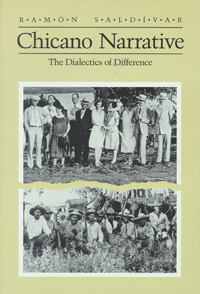|
Chicano Narrative
The Dialectics of Difference
Ramón Saldívar
"A monumental work on the scene of Chicano/a literary criticism."—Hector A. Torres, College Literature
In struggling to retain their cultural unity, the MexicanAmerican communities of the American Southwest in the nineteenth and twentieth centuries have produced a significant body of literature. Chicano Narrative examines representative narratives—including the novel, short story, narrative verse, and autobiography—that have been excluded from the American canon.
"Saldívar provides the reader with a more modern, challenging, and sophisticated critical view of Mexican American literature. His aim is to educate Hispanic and non-Hispanic educators and scholars. His book may shock those who still deny that Chicano literature must be included in the teaching of Hispanic and American literature in U.S. colleges and universities, for he strives to demonstrate that, through their works, Chicano authors represent and are part of an American reality that can no longer be ignored."—Maria A. Beltrán, Vocal, American Literature
"According to Saldívar, Chicano narrative is not just another American 'regional' literature. It is, rather, a unique type of literature of resistance to America's 'colonized oppression.' The author analyzes works of selected Chicano writers to demonstrate that the accepted paradigm of traditional American literary criticism and literary history is inadequate to evaluate properly the true value of Chicano contributions. . . . As Saldívar sees it, a new American literary history must be rebuilt on the principle of 'the dialectics of difference' to include both 'consent' and 'dissent' in order to pave the way for the emergence of a new, truly integrated American literature."—Choice
"Overcoming a literary aesthetic of invisibility has been the challenge faced by writers from Mexican-American communities of the Southwest, argues Ramón Saldívar in Chicano Narrative. Because such work itself challenges canonical tradition, Saldívar seeks alternative strategies in a wide range of postmodern critical discourses, with the result that a 'dialectics of difference' is evolved that demystifies relations between minority and dominant cultures."—American Literary Scholarship
Ramón Saldívar is professor of English at Stanford University. He is the author of Figural Language in the Novel: The Flowers of Speech from Cervantes to Joyce.
Media & bookseller inquiries regarding review copies, events, and interviews can be directed to the publicity department at publicity@uwpress.wisc.edu or (608) 263-0734. (If you want to examine a book for possible course use, please see our Course Books page. If you want to examine a book for possible rights licensing, please see Rights & Permissions.)
|
|

May 1990
LC: 89-040535 PS
264 pp. 6 x 9 20 illus.
The cloth edition,
ISBN
978-0-299-12470-0, is out of print, but the paperback is still available.
|
